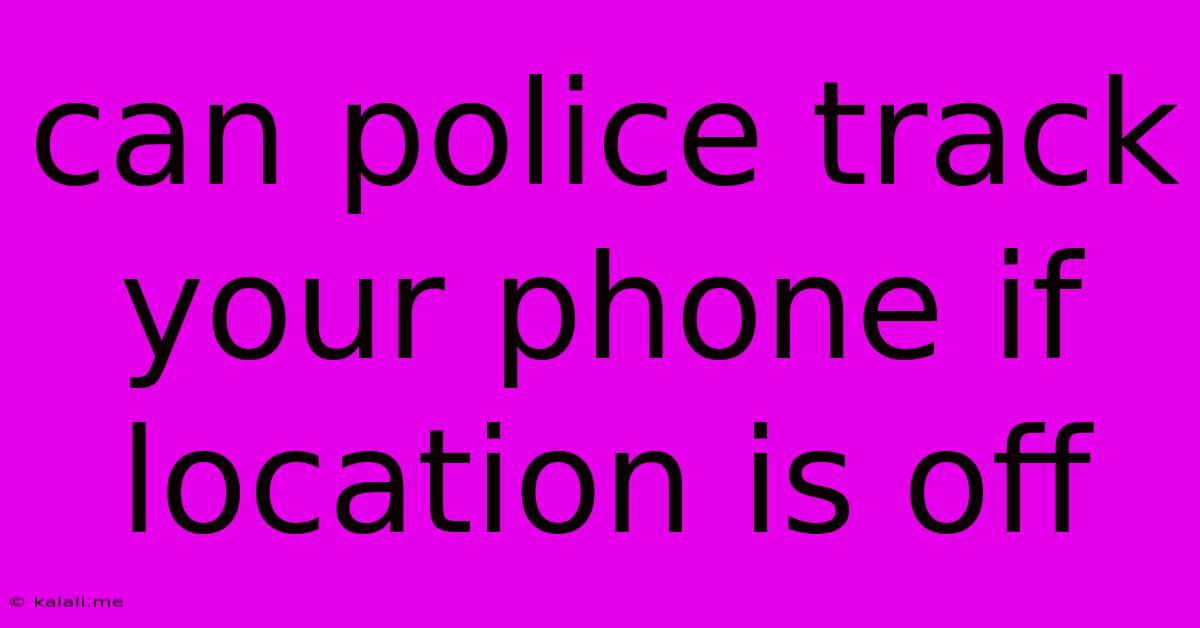Can Police Track Your Phone If Location Is Off
Kalali
May 22, 2025 · 3 min read

Table of Contents
Can Police Track Your Phone if Location Services are Off? The Complex Truth
Meta Description: Worried about police tracking your phone even with location services off? This article explores the various methods law enforcement can use to pinpoint your device, even when you think you're untraceable. Learn about the limitations and legal considerations involved.
Many believe that turning off location services on their smartphones renders them untraceable to law enforcement. While disabling location services significantly hampers the ease of tracking, it doesn't guarantee complete anonymity. The truth is far more nuanced, and depends on a number of factors. This article will explore the various ways police can potentially track your phone, even with location services disabled.
The Limitations of Disabling Location Services
Disabling location services primarily prevents apps and services from accessing your real-time GPS data. This includes apps like Google Maps, weather apps, and social media platforms that rely on location data for personalized features. However, this doesn't eliminate all tracking possibilities.
Methods Police Can Use to Track Your Phone (Even With Location Services Off)
Several methods still allow law enforcement to potentially locate a phone, even when location services are disabled:
-
Cell Tower Triangulation: Your phone constantly communicates with nearby cell towers to maintain a connection. By analyzing signal strength from multiple towers, law enforcement can pinpoint your approximate location. This method isn't pinpoint accurate, offering a broader area rather than a precise address, but it's often sufficient for investigations. The accuracy depends on the number of cell towers and the signal strength.
-
Wi-Fi Tracking: Similar to cell tower triangulation, your phone scans for and connects to available Wi-Fi networks. If your phone has previously connected to known Wi-Fi networks, law enforcement can use this data to estimate your location. The accuracy again depends on the density of Wi-Fi networks in the area.
-
IP Address Tracking: Every device connected to the internet is assigned an IP address. While an IP address doesn't pinpoint your exact location, it can often narrow it down to a city or region. This information, combined with other data, can assist in investigations.
-
Data from Your Phone Provider: With a warrant, law enforcement can obtain call detail records (CDRs) from your phone provider. These records include the cell towers your phone connected to, providing significant location data.
-
Tracking Through Other Apps: Even with location services off, some apps might still collect location data, albeit often less precisely, through other methods such as IP addresses or Wi-Fi triangulation. This is particularly true of apps with broader permissions.
Legal Considerations and Warrants
It's crucial to remember that law enforcement agencies typically require a warrant to access most of this data. The specific requirements vary by jurisdiction and the nature of the investigation. The Fourth Amendment in the United States protects against unreasonable searches and seizures, requiring warrants based on probable cause.
Protecting Your Privacy
While completely preventing tracking is difficult, you can take steps to improve your privacy:
-
Use a VPN: A Virtual Private Network (VPN) encrypts your internet traffic, making it harder to track your online activity and potentially your location.
-
Be Mindful of App Permissions: Carefully review and restrict app permissions, especially those that request access to your location.
-
Keep Your Software Updated: Regular software updates often include security patches that address vulnerabilities that could be exploited for tracking.
-
Consider Using a Privacy-Focused Phone: Certain phone models and operating systems offer enhanced privacy features.
Conclusion
The belief that turning off location services provides complete protection from tracking is a misconception. While it makes tracking significantly more difficult, law enforcement still possesses various methods to potentially pinpoint your location, especially with a warrant. Understanding these methods and taking appropriate privacy precautions can help you mitigate the risks. This information is for educational purposes only and does not constitute legal advice. Consult with a legal professional for guidance on privacy rights and legal implications.
Latest Posts
Latest Posts
-
Do You Speak English In English
May 22, 2025
-
Godaddy Domain Forwarding Not Working With Https
May 22, 2025
-
How To Get Super Glue Off Your Fingers
May 22, 2025
-
Gaucs To Pick Patterns From Time Series
May 22, 2025
-
What Does No Guard Do In Pokemon
May 22, 2025
Related Post
Thank you for visiting our website which covers about Can Police Track Your Phone If Location Is Off . We hope the information provided has been useful to you. Feel free to contact us if you have any questions or need further assistance. See you next time and don't miss to bookmark.